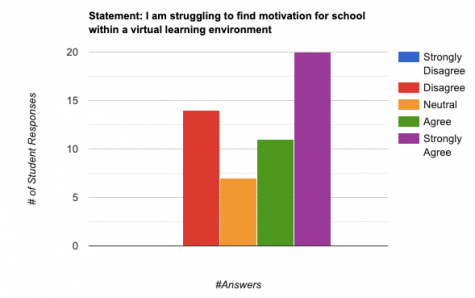There’s Still Hope
How All Failures Can Add up to Good Things
Photo courtesy of Emma Matthews Digital Content Production on Unsplash
As classes get harder and the learning environment shifts online, students are increasingly losing motivation to work. Whether it is a lack of structure or engagement, students are struggling to find ways to get motivated again. Having said that, there are many ways to renew motivation, and that starts with pushing through.
March 23, 2021
This school year has been very hard on all of us. Some of us go to school in-person, while others stay home and learn online. Either way, going to school isn’t in the ideal form that we are used to. That being said, students, specifically high school students, have been struggling with their work.
I know, I have been there. Recently, especially since the start of the second semester, I have been feeling increasingly unmotivated and have seen myself becoming more careless in terms of how I perform on quizzes and tests. Everytime we would have vacations, such as winter break, I would find myself unwilling to attend school after. I have almost never felt that much dread to go to school before, as I am almost always willing to go to school. Overall, I just find myself more unmotivated since this virtual learning option became popular. I have narrowed it down to school being virtual and my classes being harder than usual. Since this is my junior year, supposedly the hardest year of high school in general already, I have much harder classes, plus learning virtually can be especially frustrating.
High school students all over have been struggling with online learning. This has become national news, as prominent news sources such as the Today Show have even made a segment on this issue. Several students have been struggling with a lack of motivation, and I would say that it is rather normal, given the circumstances students have been put in.

The bar graph above depicts the amount of students in Kentucky schools who struggle with motivation, which is the highest out of all three bars in the graph. It also shows that, while some students maintain their motivation (depicted by the red bar), no student “strongly disagrees” about their struggles with motivation. Via KyForward.
One of the main causes of this sudden decrease of motivation is the lack of interaction with other students, according to the National Association of Student Financial Aid Administrators (NASFAA). This is a key factor to a student’s motivation in school, and I have seen this with myself. Many students would much rather prefer going to school simply because of the connection they feel to their environment. According to EdSurge, a magazine about education, this connection to the environment and school experience is what stimulates better engagement and memory retention. This is especially true with students like me who need hands-on teaching to learn better.
Another interesting cause for a lack of engagement and motivation is the lack of structure and support. I have seen myself struggle with this as well as a lot of other students. While distance learning does require independence and self-paced learning, many students do still require support, especially those who are taking higher level classes, or Advanced Placement (AP) classes.
Given the current situation with online learning and student motivation, I did some extensive research on my recent lack of motivation, and I found a couple of interesting things.
The most interesting concept I discovered was the Law of Wasted Effort. This concept focuses on the definition of success and what the real definition of failure is. According to this concept, scientists have found that nature and animals are the most receptive. For example, lions are only successful in 25 percent of their hunting attempts, leaving 75 percent to end in failure. However, many predators don’t give up in their attempts, and they keep going at it until they succeed.
The fact simply is that nature keeps throwing obstacles in every animal’s way. Fish eggs die before they hatch and baby bears die before hitting puberty. Terrible things happen in nature, but every animal learns to move on. That is the only choice they have if they want to survive.
That being said, the Law of Wasted Effort is a rule that is ingrained in the minds of every animal. For them, repeatedly trying is an instinctive behavior, something they don’t even have to think twice about. For them, it’s either try harder or die, because survival is the only thing in their mind.
So, why isn’t this true for humans? Humans also struggle as much as animals do.
However, the only difference is that humans think that they have failed after a couple of failed attempts. For humans, it is not instinctive to keep on trying; it is only possible after we think about trying again, and thinking about it can actually hinder our progress rather than enhance it.
This is also why the Law of Wasted Effort is also known as the Law of Least Effort. This version of the law suggests that progress and desires are easily achieved and fulfilled through the least amount of effort, or resistance. This is, yet again, another law that governs nature, where a lot of the events that transpire require the least amount of expended effort. For example, fish do not try to swim; they just do. Birds don’t try to fly; they just fly. This is how nature has been able to progress over the years.
But how does this relate to humans? Doesn’t effort need to be put in?
Naturally, humans are driven beings; we thrive on making our dreams our reality, and we often need to work hard to achieve this. So, yes, effort does need to be put in. While it is not that effort shouldn’t be put in at all, there are ways to minimize the effort put in and still be able to achieve the desired outcome.
The best way to do this is to power your actions with love. According to Inner Self, a website that focuses on inner health and success, actions motivated by love is what expends the least amount of effort while conserving and producing energy at the same time. When actions are motivated by power, exerting control, negativity, etc., it uses a lot of wasted energy, and by the end, one has spent all energy possible, therefore attributing to a lack of motivation. The website also suggests that actions that are overall referencing to oneself, the effect of it is opposite; you do not do much for yourself, except drain all the energy and hope. By changing this motivation to doing things for others (love), your energy multiplies and the least effort is expended because you are doing it out of genuine love.
If you think about it, nature is a place powered by the act of giving. Nature gives life. It gives shelter, it gives families, it gives love. Nature gives. That is how it thrives on the least amount of effort because it doesn’t take away more than it gives. That is what love is, and when your actions and motivations are powered by love, your energy is renewed and you have one more reason to keep going in life.
Inner Self also cites three components to the Law of Least Effort: Acceptance, responsibility, and defenselessness.
The acceptance component of this law means making a commitment: committing yourself to doing something, and in the end, seeing it through. But, part of this also means accepting things as they are in that moment. For example, a student has a test coming up and commits to studying thirty minutes every day until test day. On test day, the student tries their best and puts in their effort into doing well. However, the results were not what the student expected, and they conclude that their effort was wasted. The only choice the student has is to move on and make things better next time. And yes, while that effort was wasted, it is what happened in the end, and the student cannot change that. By accepting the circumstances of the moment, we learn not to waste our energy brooding over it and instead wish and see to it that better things happen in the future, which is what acceptance is.
Responsibility is the next step to this circumstance. It means not blaming others or yourself for the outcomes of a particular moment. Responsibility means crafting a response to the outcome you received. For example, the student now decides to go ask for help in tutorial sessions with their teacher in order to make sure they understand the material. That is accepting responsibility to do better in the future.
Defenselessness is the last component of this law, which focuses on renouncing the need to defend yourself. Another natural human trait is to get defensive of everything, and we have been taught to control that since childhood. Renouncing the need to defend your ideas, blaming others, etc. can preserve energy and bring back the energy that was previously wasted. Keep in mind that this is not saying to not become defensive at all, it just teaches you to not become overly defensive or feel the need to defend yourself all the time.
The last, and most important, thing I want to talk about is knowing your purpose. Knowing your purpose for why you do what you do and who you are is crucial to renewing motivation and boosting energy and self-esteem. As an AP student, I take about 4-5 higher level classes (including Pre-AP and AP classes), as well as a couple of leisure classes. I do this every year, and every year, I get the same question from my peers:
“Why do you take so many high-level classes?”
Here is my answer: To improve myself. My purpose in taking so many high level classes is to grow and improve myself every year so that I can be the best version of myself. I take such difficult classes because I want to prove to myself that I am trying my hardest and that I am making the most of my high school experience. I also take such classes to prepare myself for the future and to make my later years easier on myself, because you have to work hard at some point. If not now, then later. In my experience, now is better than later.
So, think about it. Why do you choose to learn every day? Why do you choose to do what you do? It really helps to think about your purpose and remind yourself everyday what and who you are doing it for. That is the best way to renew your motivation.
From now on, try to change your perspective in these times. Think of them as another chance to improve yourself. Another chance to change. While I know it is hard, know that this feeling is temporary, and soon enough, you will be back on your feet again. Until then, hang in there and try your best, because that is all that matters in the long run.






![Senior Jett Mckinney stores all the clothes in his own room, with half of it stored in his closet along with his personal clothes, and the rest taking up space in his room.
“There’s been times [when] there’s so much clothing stored here and it gets overwhelming, so I end up having to sleep somewhere else in the house,” Mckinney said.](https://cphswolfpack.com/wp-content/uploads/2025/11/DSC_0951-1200x800.jpg)



![Broadcast, yearbook and newspaper combined for 66 Interscholastic League Press Conference awards this year. Yearbook won 43, newspaper won 14 and broadcast took home nine. “I think [the ILPC awards] are a great way to give the kids some acknowledgement for all of their hard work,” newspaper and yearbook adviser Paige Hert said. “They typically spend the year covering everyone else’s big moments, so it’s really cool for them to be celebrated so many times and in so many different ways.”](https://cphswolfpack.com/wp-content/uploads/2025/05/edited-ILPC.jpg)




![Looking down at his racket, junior Hasun Nguyen hits the green tennis ball. Hasun has played tennis since he was 9 years old, and he is on the varsity team. "I feel like it’s not really appreciated in America as much, but [tennis] is a really competitive and mentally challenging sport,” Nguyen said. “I’m really level-headed and can keep my cool during a match, and that helps me play a bit better under pressure.” Photo by Kyra Cox](https://cphswolfpack.com/wp-content/uploads/2025/09/hasun.jpg)

![Bringing her arm over her head and taking a quick breath, junior Lauren Lucas swims the final laps of the 500 freestyle at the regionals swimming competition on date. Lucas broke the school’s 18-year-old record for the 500 freestyle at regionals and again at state with a time of 4:58.63. “I’d had my eye on that 500 record since my freshman year, so I was really excited to see if I could get it at regionals or districts,” Lucas said. “ State is always a really fun experience and medaling for the first time was really great. It was a very very tight race, [so] I was a bit surprised [that I medaled]. [There were] a lot of fast girls at the meet in general, [and] it was like a dogfight back and forth, back and forth.” Photo by Kaydence Wilkinson](https://cphswolfpack.com/wp-content/uploads/2025/03/Kaydence-2.7-23-edit-2.jpg)


![As her hair blows in the wind, senior Brianna Grandow runs the varsity girls 5K at the cross country district meet last Thursday. Grandow finished fourth in the event and led the varsity girls to regionals with a third place placement as a team. “I’m very excited [to go to regionals],” Grandow said. “I’m excited to race in Corpus Christi, and we get to go to the beach, so that’s really awesome.” Photo by Addison Bruce](https://cphswolfpack.com/wp-content/uploads/2025/10/brianna.jpg)

















![Holding a microphone, baseball booster club president Chris Cuevas announces the beginning of the annual cornhole tournament. The event has been held for the past two years and is designed to raise money for the baseball program in a fun way. “We’re a baseball team, so people love to compete,” Cuevas said. “So we figured we better do something that gets [their] attention. They want to compete. It’s not a hard sport to do, and we have all different [skill] levels [of participants].” Photo by Henry Mueller](https://cphswolfpack.com/wp-content/uploads/2025/11/Henry-715-1200x900.jpg)


















